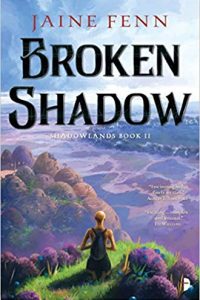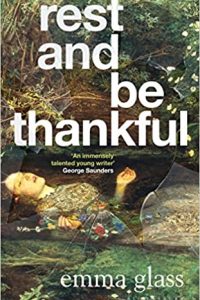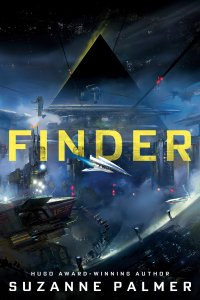Gabino Iglesias Reviews Bad Cree by Jessica Johns
 Bad Cree, Jessica Johns (Doubleday 978-0-38554-869-4, $27.00, 272pp, hc) January 2023.
Bad Cree, Jessica Johns (Doubleday 978-0-38554-869-4, $27.00, 272pp, hc) January 2023.
I love reading books that aren’t supposed to work and somehow not only work but they’re good. The ARC of Jessica Johns’s Bad Cree starts comes with a letter from Doubleday Senior Editor Margo Shickmanter talking about how Johns was told by a writing instructor to never write dreams unless she wanted to bore readers. Johns is Cree, and dreams are an important part of Cree traditions, so she wanted to prove the instructor wrong. To do so, Johns wrote a short story about a Cree woman whose dreams affect her waking life. That story won two awards and later became Bad Cree.
Mackenzie wakes up from a nightmare holding a severed crow’s head. Then she blinks and the head disappears. If this were a single strange occurrence, she could find an explanation or simply ignore it, but waking up holding things from the dream world is something that has been happening to her lately. Also, there are crows outside her apartment all the time and they seem to follow her to work as well. Mackenzie has been dealing with grief and guilt that started with the death of her grandmother and got worse when she lost her sister, and these nightmares, most of which take place in spots she remembers and some of which appear to have links to her past, soon take over her life and keep her from sleeping properly and going to work. When she finally accepts that the nightmares are too much to handle on her own, Mackenzie returns home, but the nightmares and the anger, grief, and guilt that haunt her won’t just go away because she’s back home.
Besides the dreams, which work well and reminded me of Tananarive Due’s The Between, there are other elements that shouldn’t work that Johns makes work for her in this novel. For starters, the novel is narrated in present tense, which gives it an undeniable sense of immediacy. However, more than half the narrative has to do with dreams, and most of the time when Mackenzie is awake, the story is about her memories. The constant shifting between past, present, memory, and dream could’ve been confusing, but Johns pulls it off. Also, there’s a mixing of dream world and reality here that is often tricky to pull off, but Johns does it well by adding enough detail to make it believable but also allowing incredulity to be part of the equation.
Bad Cree is the kind of horror novel that might make some readers uncomfortable with its few scenes of death and occasional bursts of gore, but it’s much more than that. While the author set out to prove that instructor wrong about the dreams, the essence of this novel is deeply rooted in Cree culture. Mackenzie has a hard time accepting what she’s experiencing, but conversations with family back home open her eyes to the many ways in which Cree people see dreams, death, reality, and even the future. With this, Johns joins a stellar group of Native American writers like Stephen Graham Jones, Erika T. Wurth, and Shane Hawk in bringing her heritage and culture to the page and sharing it with the world.
There is enough fear, tension, and dark visions in this novel to call it horror, but its strengths are the way the author focuses on Mackenzie and the women in her family and the ease with which she shows how accepting Cree culture is of things that, for other cultures, would be considered crazy, unreal, or otherworldly.
Bad Cree is a strong debut from a “Nehiyaw auntie,” and it’s a book that will should place Johns on many readers’ radars.
Gabino Iglesias is a writer, journalist, professor, and book reviewer living in Austin TX. He is the author of Zero Saints and Coyote Songs and the editor of Both Sides. His work has been nominated to the Bram Stoker and Locus Awards and won the Wonderland Book Award for Best Novel in 2019. His short stories have appeared in a plethora of anthologies and his non-fiction has appeared in the New York Times, the Los Angeles Times, and CrimeReads. His work has been published in five languages, optioned for film, and praised by authors as diverse as Roxane Gay, David Joy, Jerry Stahl, and Meg Gardiner. His reviews appear regularly in places like NPR, Publishers Weekly, the San Francisco Chronicle, Criminal Element, Mystery Tribune, Vol. 1 Brooklyn, the Los Angeles Review of Books, and other print and online venues. He’s been a juror for the Shirley Jackson Awards twice and has judged the PANK Big Book Contest, the Splatterpunk Awards, and the Newfound Prose Prize. He teaches creative writing at Southern New Hampshire University’s online MFA program. You can find him on Twitter at @Gabino_Iglesias.
This review and more like it in the July 2023 issue of Locus.
 While you are here, please take a moment to support Locus with a one-time or recurring donation. We rely on reader donations to keep the magazine and site going, and would like to keep the site paywall free, but WE NEED YOUR FINANCIAL SUPPORT to continue quality coverage of the science fiction and fantasy field.
While you are here, please take a moment to support Locus with a one-time or recurring donation. We rely on reader donations to keep the magazine and site going, and would like to keep the site paywall free, but WE NEED YOUR FINANCIAL SUPPORT to continue quality coverage of the science fiction and fantasy field.
©Locus Magazine. Copyrighted material may not be republished without permission of LSFF.








